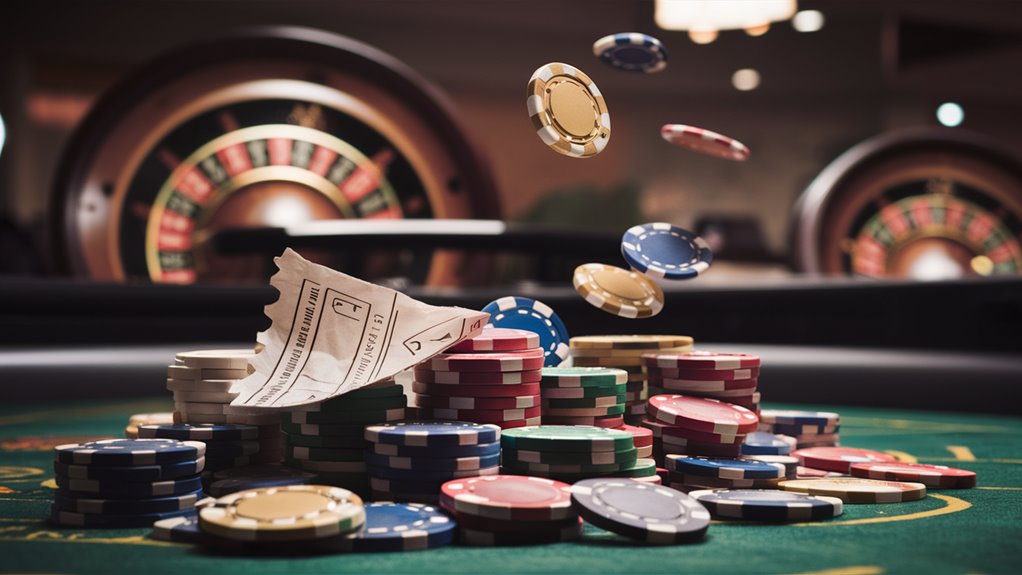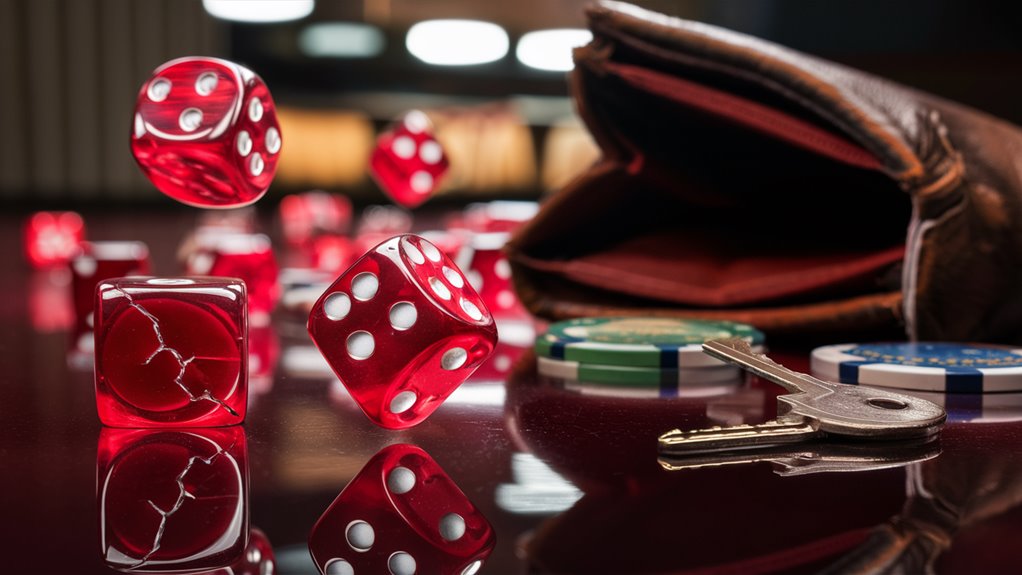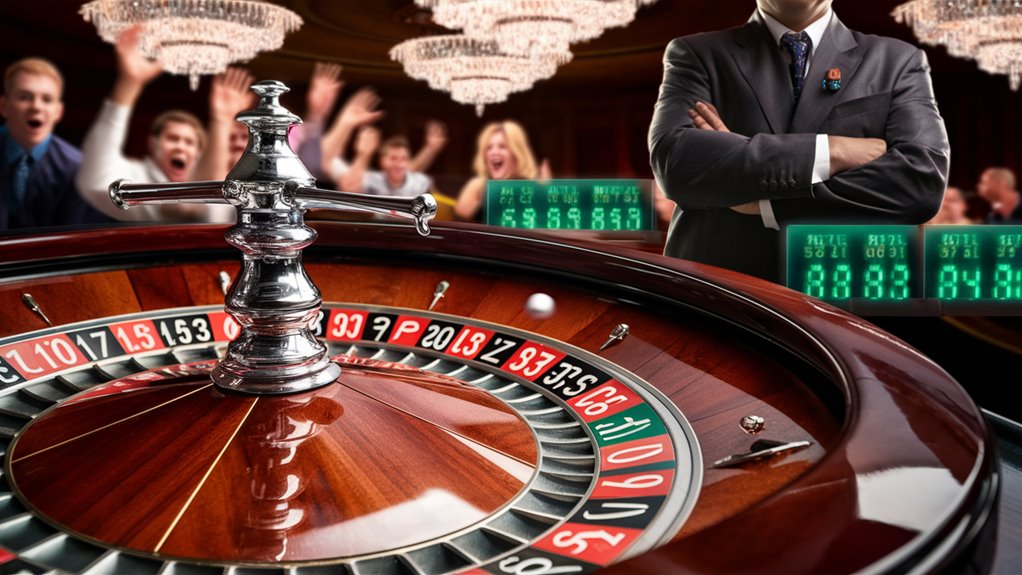
Even When You Think You’Re Winning, the House Always Wins in the End.
The Casino Always Wins: Know the Math

Casino games are based on hard math rules ensuring they make money over time. Even when players have some luck and win sometimes, the core rules keep the house on top.
How Casinos Earn Money
Every game in a casino has a set house edge, calculated using fixed odds and payments. This advantage, between 1% to 15%, ensures a bad deal for players. It slowly takes their money over time.
The Tricks of Mind and Space
The casino setup uses smart tricks to keep you playing: 메이저사이트
- Flashy lights and massive win sounds boost the thrill
- The layout makes you gamble more
- Free things keep you there longer
- Big wins make loud noises; losses stay quiet
A clever blend of math, mind tricks, and setting creates a system where the casino wins, regardless of daily player wins.
Why Casino Layout is Key
Inside Look at Casino Design
Clever Building Tricks
Casino design plays with your mind to keep you engaged. The tricky paths make you a bit lost, exits are hard to find while games are always visible.
Playing with Lights and Colors
The feel of the place matters, set by lights and colors. Bright lights focus you on tables, dim surroundings keep you from tracking time. Using lots of red and gold creates feelings of luck and wealth. There are no clocks or windows to disconnect you from time outside.
The Vibe and Sound
The casino space is tuned perfectly with sounds and air. Casino noises like slot bells and shuffling cards mix with cheers to keep you pumped. Even the air you breathe is adjusted to keep you awake and in the game. It’s all designed to make you stay longer and bet more.
Understanding the House Edge
About Casino House Edge
What’s the House Edge?
The house edge is a sure math advantage that secures casino profits over time. It’s a percentage of all bets, showing the loss you’ll face over a long play. If a game has a 1% edge, you might lose about $1 for every $100 bet as time passes.
House Edge per Game
Different games have their own edge levels:
- Slots: 2-15% edge
- Roulette: 5.26% edge
- Blackjack: 0.5% edge (with smart play)
The Math of Casino Edge
The house edge grows with each bet, like negative compound interest. This math rule means more play time nearly always leads to more losses. While quick wins are possible, the basic odds setup helps the casino maintain its advantage, no matter what happens short-term.
Wise Playing
Basic strong play in games like blackjack can reduce the house edge, but can’t remove it entirely. The basic odds in casino games mean long sessions almost always favor the house, making time a crucial part of wise gaming. Understanding these math rules helps players make smart decisions on how they play and manage expectations.
Lucky Streaks are Just Chance
The Truth on Lucky Streaks
The Brain and Lucky Streaks
Ideas of lucky streaks and good times are big mistakes in gambling. Although many players believe in these patterns, a close look at statistics shows they are just chance. Seeing patterns, a natural instinct, tricks us into thinking random wins mean more than they do.
What Actually Happens
In a random sequence of game outcomes, wins and losses emerge with no order. Our brains, designed to find patterns, wrongly see these as key signs. Real statistic tests involving lots of gambling data show past outcomes don’t affect future events.
Math vs. Belief
Consider odds rules: after five wins in any given game, the odds for the next move are just as they were before. The house edge remains steady, no matter what has happened. Players increasing their bets when they feel hot are just seeing their risk rise, as the casino’s sure advantage continues.
Its Impact on Gambling
Mind tricks make players recall wins over losses, leading to the illusion of lucky streaks that seem real. This may lead to:
- More betting in supposed good times
- Longer sessions chasing that winning feeling
- Poor money choices in bets
- A higher chance for the house to win
Smart Casino Money Tactics
Smart Money Tactics in Casinos

Smart Space Design and Your Thoughts
Modern casino strategies use in-depth planning to make more money from their layout and psychological tricks. The clever structure forces you to walk in ways that lead further into play zones, keeping exits hidden. Smart monitoring systems and trackers continuously analyze player activities to optimally position games for higher profits.
Game Math and Where Games Are Placed
Casinos set precise game edges using defined payout ratios, maintaining a 2-15% edge across their offerings. Big-win games are strategically placed in high-traffic areas to showcase victories and boost the atmosphere of winning. The ambience, from the air you breathe to the room temperature, is all tuned to keep you alert and comfortable.
Maximizing Each Player’s Contribution
BIG reward programs use intelligent schemes offering free perks typically worth 20-30% of anticipated player losses. These calculated bets on player value keep individuals returning, securing long-term profits. Smart systems continually adjust to optimize revenue for each section of the floor by varying game placements and perk distributions.
Top Methods to Increase Revenue:
- Data-driven floor plans
- Intelligent game positioning
- Fine-tuned environmental ambience
- Strategic reward calculations
- Dynamic alterations in offerings
Major Betting Mistakes
Understanding Betting Mistakes
Why Players Bet Incorrectly
Casino patrons often commit similar cognitive errors that lead them to make betting decisions ensuring the house wins. These mental slips significantly influence how individuals decide what and how much to wager in each game.
Explaining Key Mistakes
The Gambler’s Error
The gambler’s error highlights a major misunderstanding of probability, where players believe past outcomes influence future events. This occurs when players bet on red after several rounds of black in roulette, although each round is an independent event.
Hot Hand Error
The hot hand error is a flawed belief in consecutive wins. Under this misconception, players increase their bets based on recent successes, mistakenly assuming the good times will continue. This only escalates the risk and potential losses.
Sunk Cost Fallacy
Sunk costs prompt players to persist even as losses accumulate. Research indicates this cognitive bias typically results in a 23% greater loss compared to those who establish strict loss limits and recognize when to cease playing.
Illusion of Control
The illusion of control appears when players believe they can influence random outcomes by their actions. Common examples include blowing on dice for better results or selecting specific slot machines they presume are due to payout.
Near-Miss Effect
The near-miss effect convinces players that a significant win is imminent following a close loss. This cognitive bias extends playtime by approximately 45 minutes, exposing them to further house advantage and amplified losses.
Its Influence on Gambling Behavior
These cognitive errors collectively result in players gambling longer and incurring greater losses. Recognizing and understanding these errors is crucial for informed betting and effective risk management.
Cash Strategies vs. Mathematical Realities in Casinos
Financial Strategies and Mathematical Certainties in Casino Gambling
Mathematical Principles Behind Betting Strategies
Authentic casino game mathematics undermines most money management strategies. Popular systems like Martingale and D’alembert cannot overcome the constant house edge present in each game.
Mathematics of Casino Probabilities
- The house edge is constant, regardless of betting method
- Each wager is independent in terms of odds
- Money management strategies regulate the rate of loss but cannot prevent losses
- Complex strategies increase the likelihood of bankruptcy
- Mathematics prevails over psychological betting strategies
Detaching from Gambling Addictions
Moving Away from Gambling Addictions
Understanding Gambling Addiction
Gambling addiction is a significant concern globally. The initial critical step towards recovery is to recognize the behavioral indicators of excessive gambling. Monitoring the duration of play, missed opportunities, and emotional impact are essential to evaluate its influence on one’s life.
Initiating Recovery
Phase 1: Recognition and Assessment
Tracking your habits helps identify detrimental gambling patterns. Focus on:
- daily gaming duration
- sleep deprivation
- absences from work or educational settings
- sacrificing social interactions for gaming
Phase 2: Intervention
Establish strict digital boundaries using:
- applications to reduce screen time
- removal of problematic games
- blocking gambling-related websites
- creating device-free zones at home
Phase 3: Constructing a Healthier Lifestyle
Replacing unhealthy habits with beneficial activities aids in sustaining recovery:
- regular exercise routines
- engaging in outdoor activities Combining Foggy Freedoms With Sharp House Maneuvers
- socializing in person with friends
- pursuing new hobbies or skills
Maintaining Continued Improvement
Stay committed to enhancing healthier habits:
- adhering to a consistent sleep schedule
- maintaining a balanced diet
- focusing on professional skill development

